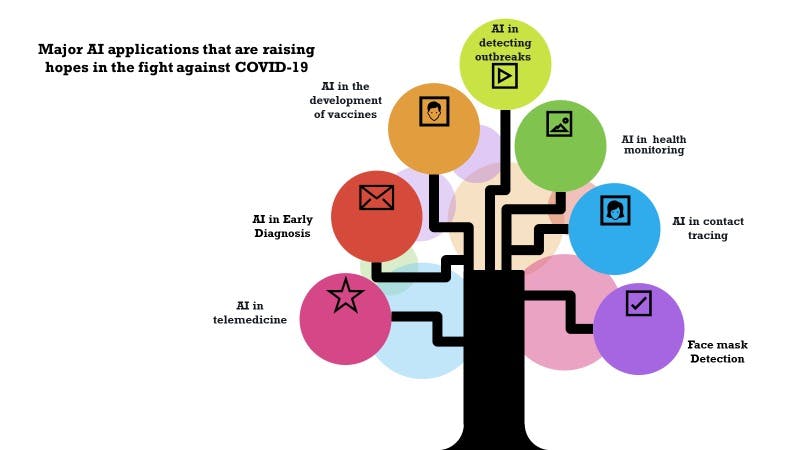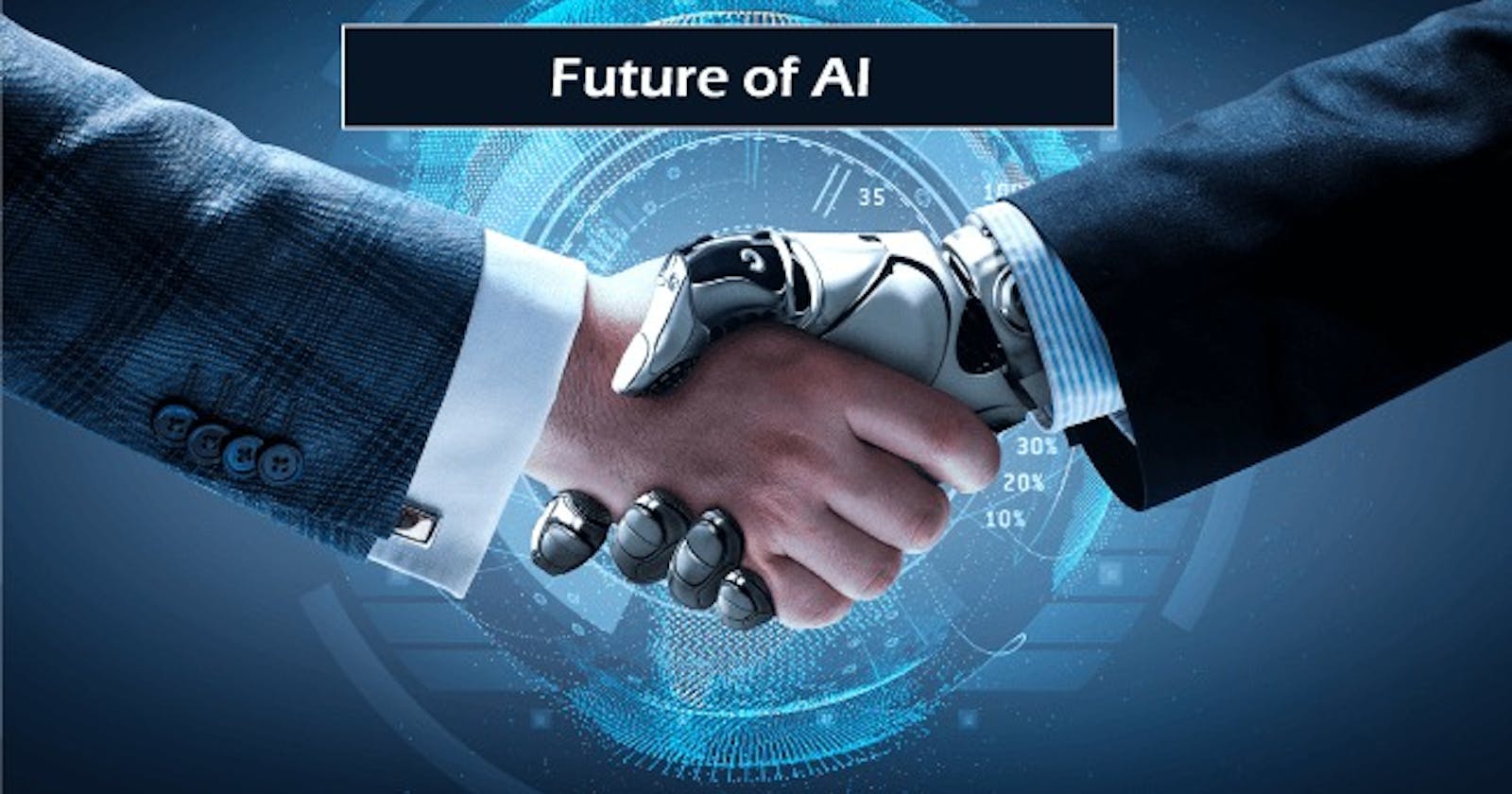Table of contents
No headings in the article.
In an environment where we are all becoming more reliant on technology, it's difficult to imagine an industry that is unaffected by AI. From driverless cars to voice automation in homes, artificial intelligence has progressed rapidly and is no longer just a concept from sci-fi movies and books. Artificial Intelligence Future is approaching faster than the forecasts made in the critically acclaimed film "Minority Report," which takes place in the year 2054.
Today we will be discussing a few questions like: What does AI's future hold? For decades, we've been striving to figure out an answer to this issue. How AI is changing the paradigm of individuals' lives.
So, let's dive in!!
Introduction
AI technology is already here vibing around us, whether we recognize it or not, and it plays a great impact on human lives. AI is lurking in the background every time we move through our Facebook or Instagram's newsfeed, do a quick Google search, attending a space on Twitter, purchase a product from amazon's recommendation section, or book a flight or movie ticket online.
*So let's first discuss what AI(Artificial Intelligence) basically is? Artificial Intelligence (AI), a key technology of the 4th industrial revolution, uses computer systems to replicate the human brain's problem-solving and decision-making abilities. Originally, AI was created to address simple problems such as chess game victory, language identification, and information extraction, among others. AI is becoming increasingly adept at doing what humans do, but more accurately, rapidly, and at a cheaper cost in addressing complicated situations, thanks to technological developments.
Artificial intelligence is influencing the future of almost every sector and every person on the planet. Artificial intelligence has emerged as the driving force behind developing technologies such as big data, robotics, and the Internet of Things, and it will continue to do so in the near future. Artificial intelligence is expected to have a long-term impact on almost every business. Artificial intelligence is already present in our connected devices, autos, healthcare system, and favorite apps, and it will continue to pervade many additional industries in the years ahead.
Today, artificial intelligence (AI) technologies and techniques play a critical role in all aspects of the COVID-19 crisis response:
- Gaining a better understanding of the disease and advancing medication and therapeutic research.
- Early detecting and diagnosing the infectious virus or the disease, and predicting its evolution or its new update.
- Surveillance and contact tracking are being used to help prevent or halt the spread of the virus.
- Personalized learning is being used to respond to a health emergency.
- Monitoring the recovery using AI wearables and developing early warning systems.
Because AI is the cornerstone of human-computer interaction, artificial intelligence is very crucial to our future. Machines can harness huge volumes of data and utilize their acquired intelligence to make effective decisions and findings in milliseconds of the time it takes people. Artificial intelligence is being credited with everything from disease research advances to cutting-edge environmental research.
Here are five trends of artificial intelligence that you are likely to encounter on a regular basis but may not be aware of.
- Google Maps and Ride-Hailing Applications
- Text Editors or Autocorrect
- E-Payments/ Online payments
- Search and Recommendation Algorithms
- Face Detection and Recognition
- Google Location Storing

AI, which was previously the focus of people's fantasies and the highlights the main of science fiction films for decades, is now a reality in people's daily lives, whether they recognize it or not. The potential of machines to replicate the competencies of the human brain, which often adapts from prior experiences to grasp and answer to language, ideas, and issues, is referred to as artificial intelligence (AI). Computer vision and conversational agents are examples of AI capabilities that have become ingrained in various sectors' typical business operations. High-tech and telecoms, financial services, and healthcare and pharmaceuticals are among the industries that have grown significantly for AI adoption in enterprises.
Below we will be seeing some great statistics on AI trends:
AI investment and startups: Globally, the AI market, which is presently valued at 327.5 billion dollars, is continuing to rise as a result of increased investment. Between 2015 and 2020, total annual corporate global funding climbed by 55 billion U.S. dollars, with the majority of it coming from private U.S. capital. UiPath, Nuro, and Indigo Ag, to mention a few, are among the most recently acquired artificial intelligence firms in the US. UiPath is the AI startup to watch, since it is the second most valuable AI unicorn startup in the world, valued at $35 billion USD, and has earned the title of most prominent robotic process automation (RPA) solution vendor among Global 2000 companies.
Key AI Statistics
- By 2027, the worldwide AI market is anticipated to be worth $267 billion.
- By 2030, artificial intelligence is predicted to contribute $15.7 trillion to the global economy.
- AI is used by 37% of enterprises and organizations.
- 90 percent of the world's most successful companies have made investments in artificial intelligence (AI), but only about 15% of them use AI in their daily operations.
- By 2025, AI will have eliminated 85 million jobs while creating 97 million new ones.
- By 2023, there will be more than eight billion voice assistants being used, up from more than three billion presently.
- By 2025, the AI industry will be worth $126 billion per year.
- Self-driving cars are safer than ordinary cars, according to 67 percent of Americans.
- Currently, 25 countries are focusing on building self-driving automobiles.
- Within the next five years, the self-driving car sector might be worth more than $600 billion.
To keep up with the rising market, new AI positions are being developed. Processes that used to take hundreds of hours and a lot of effort will be automated. The fact that humanity will be replaced by robots and AI for certain tasks will cause issues, but it will also result in a significantly reduced chance of damage. Companies now have a critical responsibility to prepare their staff for the new employment that will be created as a result of this technology. Companies and workers may need to learn how to broaden their fields to include AI in some form in order to keep solid employment in the area.
CONCLUSION
Every year, machines and gadgets become more intelligent, yet artificial intelligence has failed to live up to the hype created by some of the world's top technological corporations. The necessity for an ethical framework is critical for the development of AI and its widespread acceptance. With numerous major institutions around the world conducting research in this sector, the future of AI appears to be brighter than ever. Although AI has the potential to disrupt the employment market, it will never be able to substitute the support and compassion of our family and friends.

